Movie Blog: Talking About 'Killing' With Joshua Oppenheimer
Listening to Joshua Oppenheimer is like listening to a waterfall. You sit down, ask the filmmaker a question, and hundreds and hundreds of words pour forth.
The experience is, in a word, overwhelming. The same can be said of his documentary/ mass-murder-reenactment experiment, The Act Of Killing, which is easily one of the most talked about, unnerving and influential films of the year.
Why? Because it's about all of us, the filmmaker says. "This film is about how we human beings tell ourselves stories to justify our actions...how we use storytelling to escape from our most bitter and painful truths."
The bitter and painful in The Act of Killing has mainly to do with the genocide of communists -- and suspected communists and ethnic Chinese -- in Indonesia in 1965. It's a history not well known in the U.S., and that may be because Western governments, including ours, welcomed the killings, as Communism was basically the enemy of the age. Death squads made up of thugs and Indonesian gangsters slaughtered the communists, and the gangsters have remained tied to power ever since, terrorizing and bullying the descendants of those they killed.
And they, whom Oppenheimer refers to as "the perpetrators," boast about it...which is how the film got started.
History of fear
"I first went to Indonesia," Oppenheimer said, "to make a film about the violence underpinning globalization by focusing on a community of...plantation workers who were being forced, because they lacked a union, to poison themselves. The women workers were spraying a herbicide with no protective clothing. It was dissolving their livers and killing them in their 40s...And while I made that film, I discovered that the biggest problem in organizing a union [in Indonesia] was fear."
Fear, that is, of being called a communist sympathizer. Oppenheimer tried to interview the descendants of the dead, but officials wouldn't allow it. Then Oppenheimer started talking to the killers, and they "queued up," boastfully recounting killing dozens if not hundreds of people "in ways far more incriminating than anything the survivors told us."
That was when Oppenheimer, and his co-director Christine Cynn, first realized they were on to something -- something huge, something important, something that could potentially change social and political realities in Indonesia.
"I felt...Oh my Gosh! It's as though this whole reality...is like going into Germany 40 years after the holocaust and finding that the Nazis had won," Oppenheimer said. "Then the question was: How do we expose that reality above all? And how do we think about that reality? How do we respond to it?"
The piece of art the ensued took nearly a decade to make, and more than 100,000 hours of footage. And it struck a nerve. The country has since responded. According to Oppenheimer, his film is "the most talked about work of culture, probably, in contemporary post-independence Indonesia."
---
Enter Anwar Congo
Exposing the reality of fear came with a gangster named Anwar Congo, the movie's main character. He's said to have killed 1,000 people during the genocide, and he was the 41st perpetrator Oppenheimer interviewed. On their first outing, as you see in the film, he brought a piece of wire and a friend to demonstrate how easy it is to garrote a communist, to take a human life. Moments after, the movie shows him reminiscing about the days of the genocide, dancing a jig on a rooftop, smiling.
"And that was a fairly typical scene," Oppenheimer said. "But it was shocking. It was horrible...You wander into what you know from the outset is hell, and you expect it's going to be hellish. But you are never quite prepared for it."
Preparing to see The Act of Killing itself is tricky, mainly because the movie is difficult to describe. The interviews with the perpetrators are straight forward enough, but the reenactments push the movie into the realm of the surreal, twist it into a puzzlebox of moral questions.
In the reenactments, the perpetrators act out the genocide in the trappings of Anwar's favorite film genres. While most scenes look like scraps cut out of B-grade gangster flicks, there's this incredible power in knowing that you're seeing actual killers act out stylized versions of the killings they did decades ago. And then in some silly musical numbers, you see things like Anwar robed in black, lifting his hands to heaven before a waterfall as one of his victims thanks him for his death. It's hard to watch, in many ways.
Politics of violence
When Oppenheimer says The Act of Killing is about "all of us," he means that our government, which we empower, is complicit in the social and political reality that grips Indonesia, and countries like it.
"The entire global south has been engineered by our government, with our tax money, through violence to resemble the Indonesia of The Act of Killing," the filmmaker says. "So we depend on Anwar and his friends for our everyday living…That's how come we are able to clothe ourselves. That's how come we are able to do our jobs. And that's pretty profound -- profoundly tragic and, I think, profoundly damaging."
Another tragedy is that the history of Indonesia is no mystery. While most Americans might not know what happened in 1965, there's "nothing in the Act of Killing we don't know," Oppenheimer says. Similarly, he sees the suffering of modern-day Indonesians as something akin to what's happened to people oppressed by powerful governments throughout time.
"We know our own country has been celebrating torture for the last decade," he said. "And now we have impunity for torturers. We know that our country is built on slavery, the killing of the Native Americans. And there's not a single -- there's never been a single presidential apology for either. The locations were slaves have been auctioned and Native Americans have been slaughtered are now strip malls and banks and Kentucky Fried Chickens."
Oppenheimer isn't operating like a journalist; he isn't trying to expose corruption, although he certainly does that. Instead, his goal is to show us what the world is actually like. He's documenting "the underbelly" of our existence, so that we – the viewers – might grapple with the moral questions that arise.
Just hear his thoughts on art:
"The purpose of art ought not to be to show us new things that we did not know, the point of art should be to help us look at, and thereby address, the painful parts of our reality that we know but have been too afraid to acknowledge."
The Act Of Killing
Killing, as Oppenheimer sees it, is quintessentially a human act. "Only humans really do it, and some chimpanzees and bonobos. So it's really an act of the higher primates...Yet, it's also a traumatic act. So we need to be able to distance ourselves from the act of killing."
Some of the perpetrators Oppenheimer interviewed would drink or use drugs while killing, to dull their senses. Anwar would use movies. He talks about leaving Elvis Presley musicals, intoxicated by the music, the feel of the film, and going to kill, happily. "Anwar was using cinema at the time of the killings to distance himself from the act of killing," Oppenheimer said. "So acting, in way, was always part of the act of killing, for him."
And since the killings, Anwar hasn't really stopped acting. He constantly brags about his being a gangster, despite the fact that the killings trouble him deeply.
"He's desperately trying to convince himself that what he did was right," Oppenheimer says. "That is maybe the key finding of the film: that the boasting of mass killing is not a sign of feeling no remorse. Instead, it's a defensive effort to convince himself that what he did was right. They are boasting because they have a conscience. That's paradoxical a little bit. They are boasting because they are moral, and the tragedy of it is that the boasting itself necessitates committing further evil. Now they have to oppress their victims."
'More humane killing'
Oppression is documented in the film in many ways. Gangsters and death squad members are seen walking up to merchants in a market, threatening to beat them unless they hand over envelopes of money. Some of the gangsters have even gone into politics, reaching levels of seniority high as vice president.
People in such political authority also direct parts of The Act Of Killing, in a way. During a particularly unnerving reenactment, where Anwar and his fellow gangsters set fire to a village, one of the gangster leaders calls: cut, cut, cut. 'This is going to make us look bad,' he tells the gangster-actors. But what he says next is a little hard to grasp. First, he reassures everyone that, of course, we want these people killed, but just in a more "humane way."
That phrase of "humane killing" is deployed often by the gangsters in power, and at one point a talk show host uses it to praise Anwar and his wire-strangling technique.
"Anwar invented a more humane way of killing," she says. "Let's give him a round of applause!"
According to Oppenheimer, both the talk show host and the senior gangsters are, in a way, saying that: "Yes, genocide is at the core of who we are. What this regime is, what this collective is. But we need to wrap it in some kind of...we need to candy coat it so that we can live with it."
Reactions
When Anwar watched the film, he was very moved.
"He was silent for a long time. He was a little tearful," Oppenheimer said. "And he pulled himself together and said, 'Josh, this film shows what it is like to be me, and I'm grateful that I had the chance to finally show my feelings. What it really feels like to be me.'"
Oppenheimer says he's still in contact with Anwar, that he speaks with him via phone or Skype every few weeks. This communication, I think, reflects on how Oppenheimer treats Anwar in the movie.
Although Oppenhiemer could have easily made Anwar out as a monster, he doesn't appear nearly so one-dimensional. He's done horrible things, to be sure, but Oppenheimer brings out his humanity in a way that makes the movie deeper, and much more disturbing.
Think of it this way: Anwar is human, just like we are. Perhaps the movie is saying that an atrocity like genocide is something that's part of our nature – just as aggression and submission to leaders is part of our nature. That's a disturbing thought, surely, but so is the fact that children like to watch violence. Just think of kids yelling "fight, fight, fight" on a playground, or King Joffery in Game of Thrones. It's tragically easy to imagine humans acting out killing, en masse.
"We can imagine what it would be like to kill," Oppenheimer says. "We can imagine what it would be like to live with killing."
While making the film, he said he had a horrible feeling of the familiar, even when encountering the most extreme stories and acts.
"And that was the most scary thing," he said, "because that's about us. How could this be familiar to me? I've lived this sheltered existence, and yet this is familiar? What does that say about what we are?"
Reception
The Act of Killing can't be shown in regular movie theaters in Indonesia. It would be banned by censors. Additionally, many of the credits in the film are listed as anonymous, which goes to show you how real the threat of violence is in the country. Still, hundreds of screenings have taken place, and many national magazines have devoted many pages to the film. As Oppenheimer puts it, his movie has "totally changed how the country talks about its past." But perhaps the most telling change is that "the perpetrators," he says, "no longer boast."



